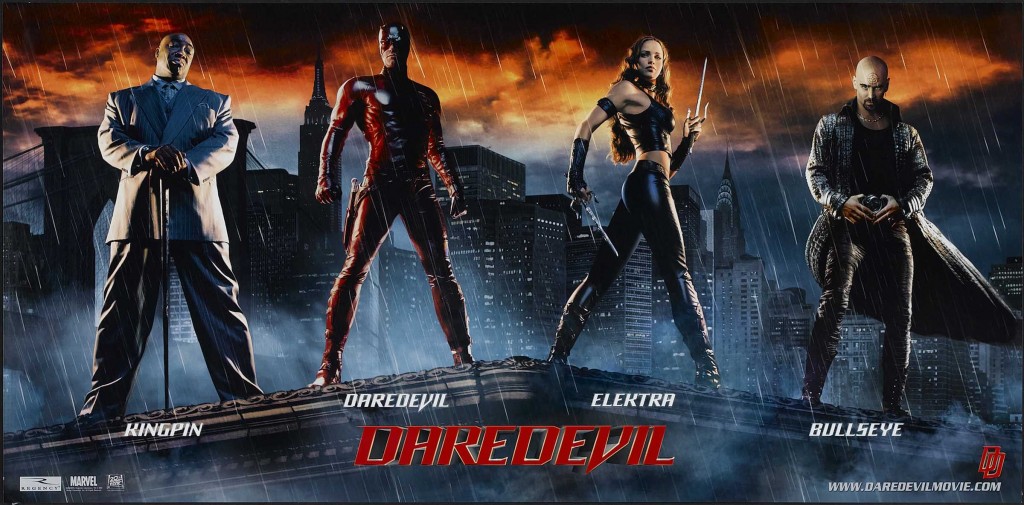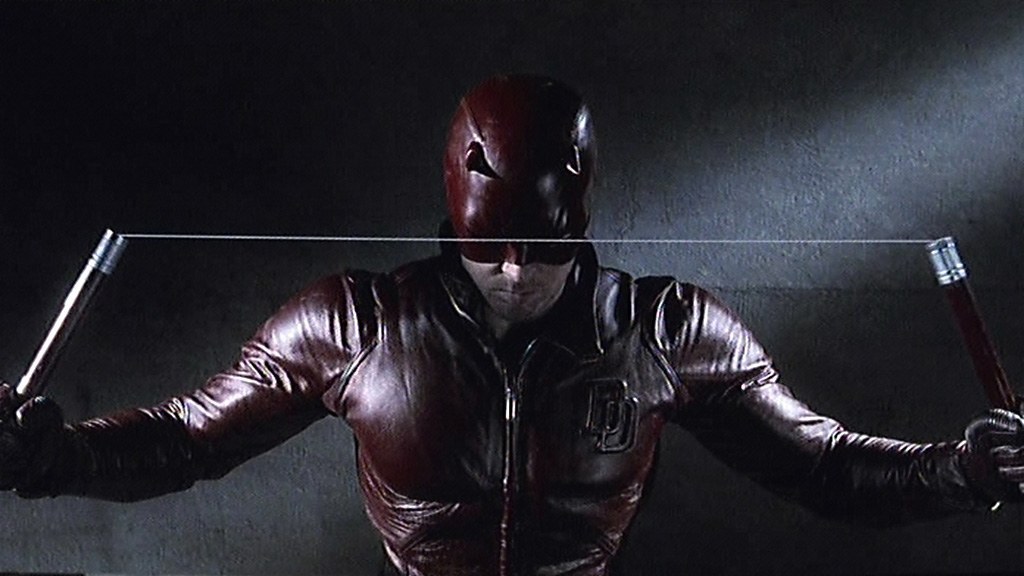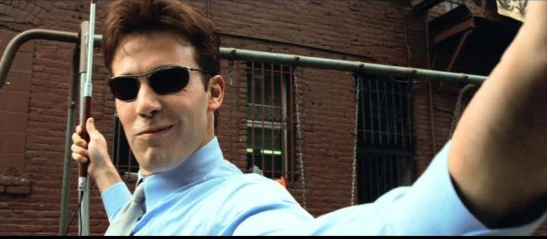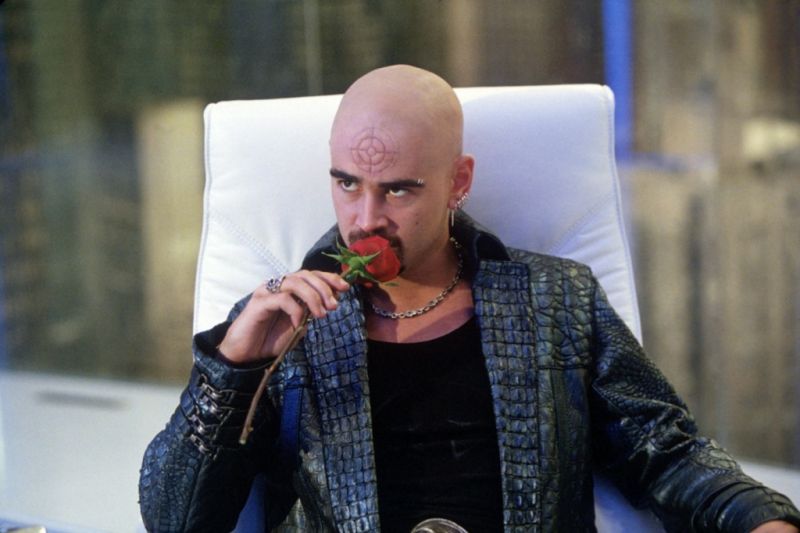Film is an entertainment medium that, by its very nature, tends to reward the viewer in rewatch. Sometimes movies even reveal to us how we’ve grown or changed since we last saw them. Our own Max Robinson reassesses old favorites, seasonal classics and the occasional oddball lost under the couch in his monthly column, Stale Popcorn.
At this point, my Stale Popcorn picks have all been movies I have some kind of fondness for. This month’s choice, writer-director Mark Steven Johnson’s Daredevil, is a pretty sharp left turn in that regard. I chose Daredevil not just because the thirteen episode Netflix adaptation of the comic/character drops tomorrow, but also because I was genuinely curious to see how it’d aged, having only seen it in theaters as a suburban teenager. I opted for the director’s cut of the film, which adds 30 extra minutes and is generally considered the superior version of the movie.
So I watched Daredevil: The Director’s Cut. I watched all 133 minutes of Daredevil: The Director’s Cut. The closest comparison I can think to make to the experience is the episode of Review when Forrest MacNeil eats 15 pancakes and just gets angrier and angrier. 2003 Max thought this was a pretty good movie. 2003 Max was a fucking dummy.
Daredevil is a really interesting study of how comic book adaptations work or, in this case, don’t work. On paper, this movie sounds fine; Matt Murdock is the blind litigator/super-powered protector we know from the comics, it’s set in a Hell’s Kitchen that certainly resembles the one found in Marvel’s New York (if not reality), and time-honored supporting characters like love interest-turned-assassin Elektra, evil assassin Bullseye, and not-an-assassin-at-all-just-a-newspaper reporter Ben Urich are all in the mix. The problem is that Johnson’s script tosses these elements together because it’s a Daredevil movie regardless of whether it works outside of a 40-year-old comic book. Johnson is so concerned with the superficial qualities of Daredevil: The Comic that we’re left with a movie that doesn’t make sense.
Ben Affleck’s Matt Murdock is the most fascinating non-character in superhero movie history. And I don’t mean that in the good way, like Karl Urban’s stoically fascist Judge Dredd. Affleck’s Daredevil/Murdock is a lifeless robot who alternates between faux-righteous anger, faux-wry humor, and flat narration that Harrison Ford would roll his eyes at. It’s so frustrating, too, because movies like Gone Girl, Good Will Hunting, and even Dogma demonstrate how compelling Affleck is on screen. Here, he’s but a strong-chinned marionette helpless against the Evanescence-fueled melodrama that is Daredevil.
Affleck-as-Murdock’s character arc, such as it is, has him failing to convict a rapist (in a trial that, from just a rudimentary legal standpoint, makes zero sense) → murdering said rapist with a subway train as Daredevil → unwittingly scaring a child several days later → feeling bad about scaring said child → deciding not to murder people. We’re not really given any reason to especially like Matt Murdock in or out of costume; He’s not an especially crafty attorney, his first encounter with Elektra finds him using PUA-style harassment in his clumsy attempts at flirting and, I want to emphasize this, HE MURDERS PEOPLE IN COLD BLOOD WITH ZERO REMORSE. A better movie would use Murdock’s bloodlust as a bold character statement, maybe the source of the character’s trademark crushing Catholic guilt. This movie almost immediately cuts to Affleck and perennial superhero movie second banana Jon Favreau doing schtick and, soon after, a goofy daytime karate fight on a seesaw.
Somehow worse than Affleck is Garner’s Elektra Natchios in what is arguably the shakiest portrayal of a Greek character in movie history. The Elektra of the comics is an amoral foil whose soul Murdock tries (and fails) to redeem. Movie Elektra gets really sad when her dad dies, is tricked into thinking Daredevil murdered her father, and then swiftly dies for the sole purpose of re-enacting the character’s iconic demise from Daredevil #181. Comics Elektra’s death hit hard because she was portrayed as an untouchable badass, one who readers had gotten to know over thirteen issues. Aside from a callback at the very end, Garner’s character is not mentioned for the rest of the film. Even ignoring the comics/movie translation aspect, Elektra is a character who dies for cheap pathos that never actually materializes.
Daredevil’s two bright spots, its borderline saving graces, are its villains. Until relatively recently, superhero movies operated under the assumption that its leads didn’t need to be especially interesting provided they had some good scene-chewing bad guys. Here, in the fine tradition of Gene Hackman’s Lex Luthor and Jim Carrey’s Riddler, we get Michael Clarke Duncan as Wilson Fisk/The Kingpin and Bullseye (Colin Farrell). Bullseye, a bald, Irish assassin with precision accuracy, is a total reinvention of the comics character that works because of the weird Looney Tunes energy he’s played with. It’s a lot fun watching Farrell wear essentially movie monster make up while gleefully murdering a mundanely racist grandmother like some kind of Hot Topic version of Hannibal Lecter.
Duncan’s Wilson Fisk isn’t quite as enjoyable, but the movie’s able to get some impressive mileage out of the late actor’s presence. There’s something incredibly sinister about The Kingpin here, between his massive physicality and jovial theatricality. (If for nothing else, Daredevil should get props for having MULTIPLE scenes in which Michael Clarke Duncan dramatically leaves a rose as a calling card.) Superhero movies being enormously white isn’t anything new, but I do have to say it’s enormously weird to watch a movie about Marvel’s premiere “street level” character in which the only African-American characters are either pure evil (Kingpin) or a comic relief career criminal defended in court by Murdock (Coolio, here essentially just playing Coolio).
There’s a lot to dislike in Daredevil. It’s a half-baked mess that wastes interesting story potential and a strong cast. Even the Director’s Cut, technically a better version of the film, is oppressively long and boring. As it is, though, it’s a fairly interesting look at a comic book movie machine still about a decade away from ironing out its kinks.







